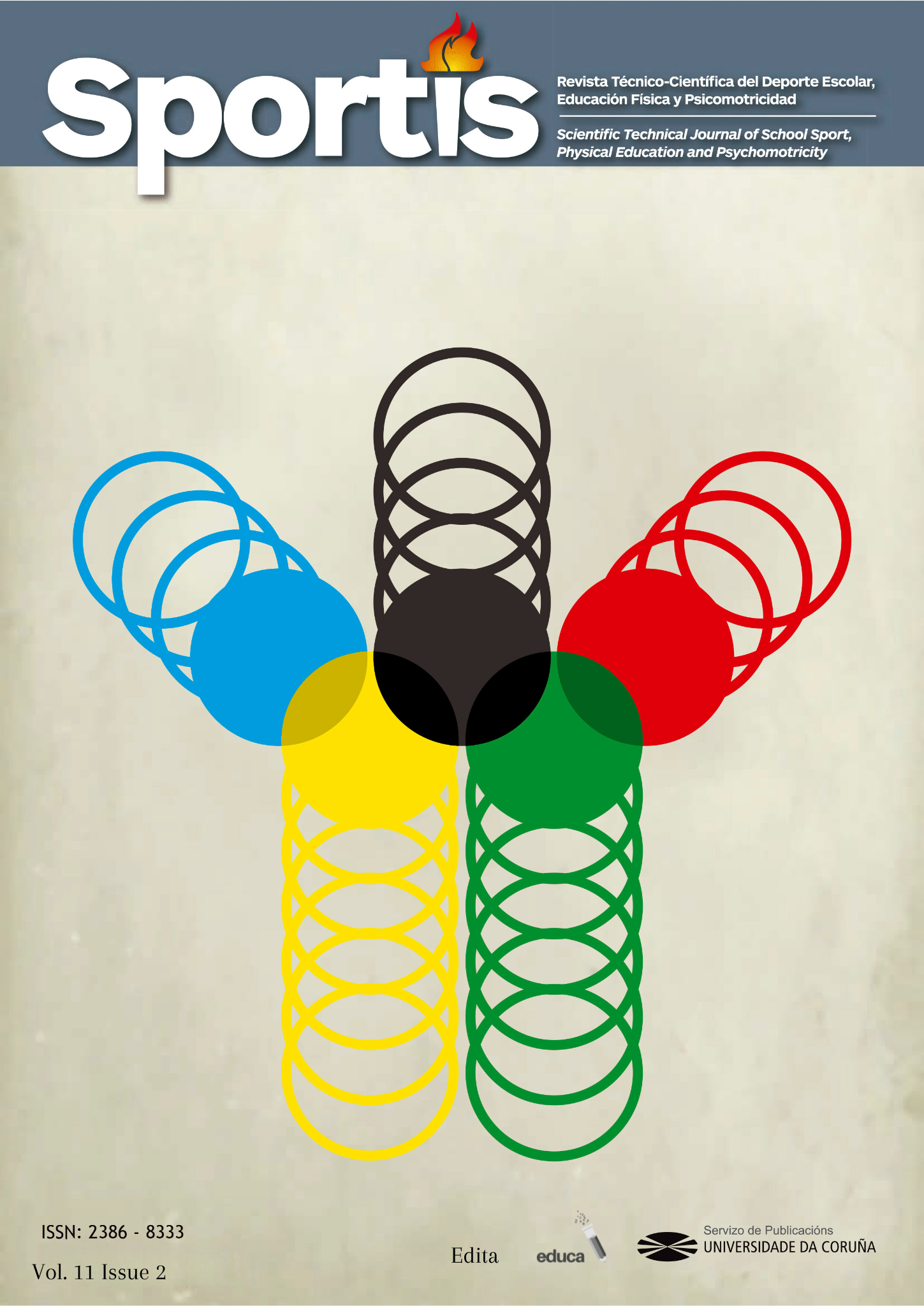Evaluación de las percepciones de los estudiantes universitarios de ciencias del deporte tras una intervención de aprendizaje-servicio en escuelas secundarias
Contenido principal del artículo
Resumen
Este estudio examinó las percepciones de estudiantes universitarios y de secundaria tras una intervención de aprendizaje-servicio enfocada en biomecánica.
Cinco estudiantes de ciencias del deporte enseñaron biomecánica a cinco estudiantes de secundaria a través de cuatro sesiones que combinaron teoría y práctica, concluyendo con una presentación en una conferencia. Las percepciones se evaluaron en dimensiones básicas, pedagógicas y organizativas, y se calculó la fiabilidad de la autoevaluación.
Ambos grupos reportaron una alta satisfacción, con puntajes superiores a 3 de 4. Los estudiantes de secundaria demostraron una autoevaluación fiable, lo que refleja una retención efectiva del conocimiento. Los hallazgos sugieren que el aprendizaje-servicio es una pedagogía efectiva en biomecánica, ya que mejora la comprensión de conceptos complejos y fomenta interconexiones positivas entre estudiantes universitarios y de secundaria.
Palabras clave:
Descargas
Detalles del artículo
Citas
Almarzooq, Z. I., Lopes, M., & Kochar, A. (2020). Virtual Learning During the COVID-19 Pandemic. Journal of the American College of Cardiology, 75(20), 2635–2638. https://doi.org/10.1016/j.jacc.2020.04.015
Bringle, R. G., Hatcher, J. A., & Muthiah, R. N. (2010). The role of service-learning on the retention of first-year students to second year. Michigan Journal of Community Service Learning, 16(2), 38–49.
Celio, C. I., Durlak, J., & Dymnicki, A. (2011). A Meta-Analysis of the Impact of Service-Learning on Students. Journal of Experiential Education, 34(2), 164–181. https://doi.org/10.1177/105382591103400205
Chiva-Bartoll, O., Ruiz-Montero, P. J., Martín Moya, R., Pérez López, I., Giles Girela, J., García-Suárez, J., & Rivera-García, E. (2019). University Service-Learning in Physical Education and Sport Sciences: A systematic review. Revista Complutense de Educación, 30(4), 1147–1164. https://doi.org/10.5209/rced.60191
Chiva-Bartoll, O., Ruiz-Montero, P. J., Olivencia, J. J. L., & Grönlund, H. (2021). The effects of service-learning on physical education teacher education: A case study on the border between Africa and Europe. European Physical Education Review, 27(4), 1014–1031. https://doi.org/10.1177/1356336X211007156
Chong, C. S. (2014). Service-learning research: Definitional challenges and complexities. Asia-Pacific Journal of Cooperative Education, 15(4), 347–358.
Claes, E., Schrooten, M., McLaughlin, H., & Csoba, J. (2022). Community service learning in complex urban settings: challenges and opportunities for social work education. Social Work Education, 41(6), 1272–1290. https://doi.org/10.1080/02615479.2021.1948003
Conway, J. M., Amel, E. L., & Gerwien, D. P. (2009). Teaching and Learning in the Social Context: A Meta-Analysis of Service Learning’s Effects on Academic, Personal, Social, and Citizenship Outcomes. Teaching of Psychology, 36(4), 233–245. https://doi.org/10.1080/00986280903172969
Cuenca-Soto, N., Martínez-Muñoz, L. F., Chiva-Bartoll, O., & Santos-Pastor, M. L. (2023). Environmental sustainability and social justice in Higher Education: A critical (eco) feminist service-learning approach in sports sciences. Teaching in Higher Education, 28(5), 1057–1076.
Izquierdo, M. (2010). Biomecánica y Bases Neuromusculares de La Actividad Física y El Deporte. Cultura, Ciencia y Deporte, 5(13), 57–58.
Jia, X., Jung, J., & Ottenbreit-Leftwich, A. (2018). Learning technology integration from a service-learning project: Connecting preservice teachers to real-world problems. Journal of Experiential Education, 41(3), 261–276.
Matthews, C., & Zimmerman, B. B. (1999). Integrating service learning and technical communication: Benefits and challenges. Technical Communication Quarterly, 8(4), 383–404.
Pecci, J., Onetti Onetti, W., & Sanchez-Trigo, H. (2024). Assessing Content Assimilation in Health Research Methodology: A Comparative Study of Lecture and Flipped Classroom Instruction. Sportis. Scientific Journal of School Sport, Physical Education and Psychomotricity, 10(1), 14–31. https://doi.org/10.17979/sportis.2024.10.1.9956
Ruiz-Montero, P. J., Corral-Robles, S., Garcia-Carmona, M., & Leiva-Olivencia, J. J. (2023). Development of prosocial competencies in PETE and Sport Science students. Social justice, Service-Learning and Physical Activity in cultural diversity contexts. Physical Education and Sport Pedagogy, 28(3), 244–258.
Salam, M., Awang Iskandar, D. N., Ibrahim, D. H. A., & Farooq, M. S. (2019). Service learning in higher education: A systematic literature review. Asia Pacific Education Review, 20, 573–593.
Scales, P. C., Blyth, D. A., Berkas, T. H., & Kielsmeier, J. C. (2000). The Effects of Service-Learning on Middle School Students’ Social Responsibility and Academic Success. The Journal of Early Adolescence, 20(3), 332–358. https://doi.org/10.1177/0272431600020003004
Serrano, L. R., Rovira, J. M. P., García, X. M., & Rodríguez, J. P. (2015). Analizar, repensar y mejorar los proyectos: una rúbrica para la autoevaluación de experiencias de aprendizaje servicio. Profesorado. Revista de Currículum y Formación de Profesorado, 19(1), 111–126.
Simons, L., & Cleary, B. (2006). The influence of service learning on students’ personal and social development. College Teaching, 54(4), 307–319.
Torres Martín, C., Acal, C., El Homrani, M., & Mingorance Estrada, Á. (2021). Impact on the Virtual Learning Environment Due to COVID-19. Sustainability, 13(2), 582. https://doi.org/10.3390/su13020582
Waldner, L. S., Widener, M. C., & McGorry, S. Y. (2012). E-service learning: The evolution of service-learning to engage a growing online student population. Journal of Higher Education Outreach and Engagement, 16(2), 123–150.
Yorio, P. L., & Ye, F. (2012). A Meta-Analysis on the Effects of Service-Learning on the Social, Personal, and Cognitive Outcomes of Learning. Academy of Management Learning & Education, 11(1), 9–27. https://doi.org/10.5465/amle.2010.0072






